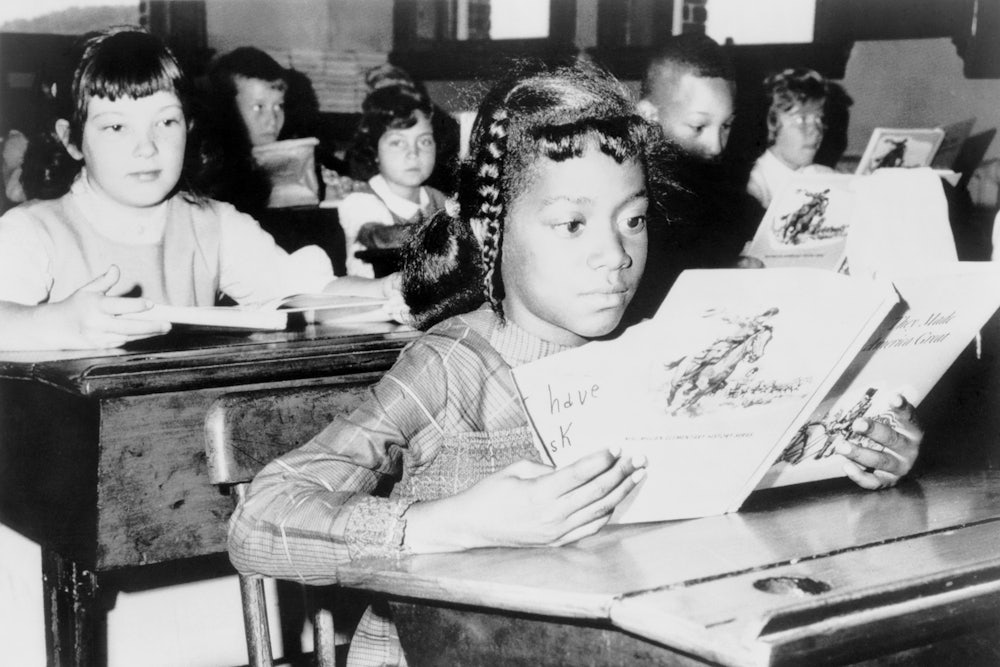The effect of Louise Day Hicks’s voice lay as much in its texture as her words. She was careful to keep her racism from spilling into the explicit, so when the United States Supreme Court ruled in 1965 that “delays in desegregating school systems are no longer tolerable,” she used soft, grandmotherly tones to make her acid remarks. “If the suburbs are so interested in solving the problems of the Negro,’’ she cooed in 1966, “why don’t they build subsidized housing for them?’’
Hicks, who was elected chairperson of the Boston School Committee in 1961 and became famous for opposing desegregation, was implying that America’s legislators all lived out in the suburbs; their kids weren’t the city whites who’d be forced to share classrooms with bussed-in Black children, so how could they possibly understand? It’s precisely the kind of bad-faith twisting of civil rights rhetoric that Leon Neyfakh investigates in the new season of “Fiasco” in “The Battle for Boston” about the so-called Boston busing crisis.
That term is a misnomer, we learn in the very first episode. Neyfakh tells us that sources hung up on him when he mentioned the word “busing.” That was Hicks’s dog whistle term, former Boston National Association for the Advancement of Colored People President Tom Atkins explains, not theirs: “Busing was a nationwide codeword.... They didn’t have to tell us what it meant. We knew what it meant.” History is made of language, and language is slippery, these anecdotes show: We grow up using the bigots’ vocabulary without even knowing it.
Ostensibly well-known but actually little understood episodes in American twentieth-century history are Neyfakh’s specialty. After leaving Slate and his popular podcast “Slow Burn,” which had delighted listeners with its ground-up retelling of the Nixon and Clinton impeachments, he took the historical format over to Luminary, a subscription app, in the form of “Fiasco.” The previous two seasons have covered the 2000 presidential election recount in Florida and Iran-Contra. The famous backlash to the equal education movement in the 1970s fits right into the theme: Many people learned about it in grade school and have the level of understanding to match.
Over the first half of the series (four of a total seven episodes were released to reviewers), Neyfakh introduces us to the real lead characters in this story while laying out the deeper context necessary to understand their significance. After the landmark Brown v. Board of Education decisions in 1954 and 1955, school boards responded by commissioning investigations into racial inequality in the classroom. In 1963, Ruth Batson was appointed to lead Boston’s effort. A local mother herself, she found that schools with all-white student bodies had gleaming new facilities, but the all-Black schools in Roxbury made do with broken crayons and what teacher Jean McGuire called “boxes of old, beat-up pencils.” When Batson met with their invariably white principals, they said wildly racist things to her face.
It was the labor of people like Batson and Atkins that set the real political action in motion by connecting the land’s highest court’s decisions to the daily reality of the classroom in a way that would, in theory, refrain from directly accusing the school board of racism. They did so by underscoring the legal difference between de jure segregation, which was legislated by the authorities, and de facto segregation, which arose as a result of racist policies in housing and other town planning matters.
After being shut down by Louise Day Hicks and the rest of the Boston school board, which was at the time little more than a rigged labor agency for white Irish Bostonians, the desegregation campaign only gained momentum. Its climax was a federal court’s ruling which ordered that Boston’s most segregated neighborhoods be integrated. It’s that line in the history textbooks that “Fiasco” pauses over to note the names and meetings and events that “common knowledge” skims over.
We hear a detailed account of the relationship between community leaders, the children of a city, and the hydra-headed monster that is the American judicial system in the words of the people who were there. We don’t just learn about the court cases that punctuate this story but about the personality of the relevant judges from their law clerks.
It turns out that the grain of the human voice has a political effect all of its own. Louise Day Hicks helped stoke racist riots with her sweet-natured voice because the TV and the radio broadcast it across the city. In “The Battle for Boston,” Neyfakh attempts to perform a reversion of that trick, instead broadcasting the buried voices of America’s recent painful history.
“Fiasco” has the best production of any nonfiction podcast I know of. It forgoes the distracting bells and whistles—not to mention the excruciating rhetorical pauses that RadioLab helped make so popular and that plague podcasts of every type. A lot of clips come from the titanic 1987 documentary Eyes on the Prize—not everything is original here—but Fiasco’s spick-and-span editing makes a compelling argument in favor of shelling out for good audio. (A Luminary subscription costs $4.99 a month.) Neyfakh’s analytical style is spare and unobtrusive, and he never asks himself stupid rhetorical questions in the tantalizing “maybe, just maybe...” vein.
As an unprecedented health crisis threatens to worsen the inequality in the American educational system, there’s no better time to return to the events that set the template for talking about race and policy in public. There’s no neutral way to narrate history, a fact made uniquely legible by podcasts, which rely so heavily on the human voice to make their claims to credibility. The range of sources in “Fiasco,” and the harmony they produce, make it much more convincing than most.
